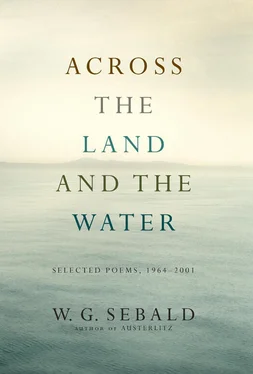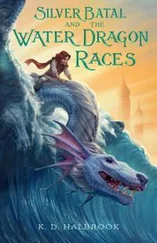70 The secretsGG1. From a manuscript handwritten on the headed notepaper of the Hotel Schweizerhof in the Hinüberstraße, Hannover. See also “Room 645” below.
71 On 9 June 1904VVJ, WS, H. Title: On 3 June 1904, the Russian dramatist and short-story writer Anton Pavlovich Chekhov, suffering from tuberculosis, set off with his wife, Olga Leonardovna Knipper-Chekhova, to the Black Forest spa resort of Badenweiler, where he died on July 1 by the Julian calendar, on July 15 by our own. Many of the details in the poem can be gleaned from Chekhov’s letters from Badenweiler to his sister, in the final two weeks of his life, or from his wife’s memoir.
72 Ninety years laterVVJ, WS, H. Badenweiler: See note above.
73 In BambergVVJ, FL, H. Little Hunchback (“das bucklige Männlein”): a figure from the collection of folk poetry entitled Des Knaben Wunderhorn (1805–8), collected by Clemens Brentano and Achim Arnim. Empress Kunigunde … Katzenberg: see note for “Cold Draught” above. dog Berganza: a talking dog in E. T. A. Hoffmann’s story “Nachricht von den neuesten Schicksalen des Hundes Berganza” (“Report on the New Adventures of the Dog Berganza”), written in 1814–15, set in Bamberg, and based on Cervantes’s “Dialogue of the Dogs” (1613). Hoffmann lived in Bamberg from 1808 to 1813, and the story starts with the narrator, who has just crossed the river, meeting the talking dog in what is apparently the Hain Park , Bamberg’s oldest park. Schorsch and Rosa: Georg Sebald and Rosa (or Rosi) Egelhofer, the poet’s parents. The scene is probably based on the photograph described in “Dark Night Sallies Forth” ( After Nature , op. cit., p. 83). Kara Ben Nemsi: fictional character and “cowboy of the Orient,” in the works of the highly popular nineteenth-century German children’s writer Karl May.
74 Marienbad ElegyVVJ, NZZ, H. Title: Like Wolfgang von Goethe’s “Marienbad Elegy,” from his “Trilogy of Passion” sequence of 1823, Sebald’s poem consists of twenty-three six-line stanzas, and one might think any resemblance to Goethe’s metrically controlled rhyming “tempest of feeling” ended there, were it not for the title. Sebald’s detachment from the Dichterfürst (prince of poets) is respectful in the mildness of its irony, and yet one senses that something about Ulrike’s personal effects, preserved in the Marienbad Museum, must have touched the twentieth-century author and inspired his own pensive elegy. The apparent subject of the poem is Goethe’s unrequited love, at the age of seventy-three, for the eighteen-year-old Ulrike von Levetzow, whom he had met at Marienbad a year earlier, and would see for the last time a year later in Karlsbad, on the occasion of his seventy-fourth birthday. Ulrike remained a spinster, and died in 1899 at the age of ninety-five. The poet Michael Hamburger, who did a translation of “Marienbad Elegy” not long after Sebald’s death, has written that Ulrike von Levetzow died “a full century and a half after her rejected lover’s birth. Somehow this almost macabre time span strikes me as relevant to the irony and pathos of a poem obsessed as its author was with transitoriness and the interweaving of seemingly unconnected phenomena and events.” See Irish Pages , Autumn/Winter 2002/2003 (p. 132).
75 At the edgeVVJ, H. This poem and the three that follow, from the ambit of what Sebald called his “micropoems,” were not included in the volume For Years Now or in Unrecounted .
76 And alwaysGG1. See note above.
77 How silveryGG1. See note for “At the edge.”
78 SomewhereGG1. See note for “At the edge.” Türkenfeld is a town on the Allgäubahn (Allgäu Railway). A brief discussion of the significance of Türkenfeld and its surrounding region during the period of National Socialism appears in the Translator’s Introduction that prefaces this volume. Sources: Augenzeugen und Bilder berichten. Die Häftlinge aus den KZ-Außenlagern Landsberg/Kaufering auf dem Todesmarsch im April 1945 durch den Landkreis Fürstenfeldbruck nach Dachau: Arbeitskreis Mahnmal Fürstenfeldbrück, Fürstenfeldbrück, 2007; “Berichte von Zeitzeugen aus der Hölle von Kaufering,” in The European Holocaust Memorial: Bürgervereinigung Landsberg im 20. Jahrhundert e.V . (www.buergervereinigung-landsberg.org).
79 In the sleeplessVVJ, AK48, H. Town Musicians: the Grimms’ tale “The Town Musicians of Bremen,” about a donkey, cat, dog, and cockerel who attack a robber in the dark.
80 Room 645VVJ, AK48, H.
81 My ICE Rail-PlannerVVJ, AK48, H. The poem appears to contain a collage of so-called “found” material, elements of which — e.g., text from hoardings, advertisements, or passages from newspaper articles — Sebald frequently integrated into his poems. radio, transmission … building components: advertisement by Alcatel Sel AG in Berliner Zeitung , Wirtschaft (19 November 1994).
82 One Sunday in Autumn 94VVJ, AK48, H. Father of the German Nation: This term casts Helmut Kohl, the first German chancellor after German reunification, in the role of the Iron Chancellor, Otto von Bismarck.
83 Calm November weatherVVJ, AK48, H. literary villa: founded by Walter Höllerer in 1963 and one of the most important literary institutions in Berlin, indeed in Germany, the Literarisches Colloquium Berlin hosts a constant flow of readings, seminars, and discussions throughout the year and also functions as a guesthouse for writers-in-residence. Sebald visited the Colloquium on several occasions. On one such occasion, in November 1997, the Greenlandic poet Jessie Kleemann read from her work.
84 Unchanged for yearsVVJ, AK48, H. The list of common brand names in the second stanza ( Nordhäuser Doppelkorn is a spirit, Gau Köngernheimer Vogelsang a wine from the Rheinhessen region, and Rotkäppchen— Little Red Riding Hood — a sparkling wine from East Germany) includes a pun on the name of a German brandy, Asbach Uralt, literally “Ancient Asbach.” Instead of the brand name, however, Sebald playfully writes “der uralte Asbach,” “the age-old Asbach.”
85 In the Summer of 1836VVJ, K&C, H. The composer Frédéric Chopin (1810–49) fell in love with the sixteen-year-old Maria Wodzinska and, in July 1836, proposed marriage to her at the White Swan inn at Marienbad, where the Wodzinska family was staying. She accepted the engagement, but her mother, realizing that her husband was against the union, made secrecy the condition of her own consent. The family returned to Poland in 1837; the plans never came to fruition and indeed only came to light after Chopin’s death with the discovery among the composer’s papers of Maria’s letters, in an envelope marked “Moja Bieda” (my wretchedness).
86 In AlferméeVVJ, K&C, H. Title: Alfermée is a small village in the canton of Bern on the banks of Lake Biel (Bielersee, Lac de Bienne), in Switzerland. a language you do not understand: Alfermée is the home of the critic Heinz Schafroth, an expert on the work of the German poet Günter Eich, whose ashes were scattered by his wife, the writer Ilse Aichinger, in the vineyards of Alfermée. Sebald visited Schafroth’s house twice: once during the winter of 1997, when he was holding the lectures at the University of Zürich on which he would base his book Luftkrieg und Libteratur ( On the Natural History of Destruction ); and once in the summer of the same year, when, accompanied by Heinz Schafroth, he visited St. Peter’s Island on Lake Biel, an expedition described in the second chapter of Sebald’s book of essays Logis in einem Landhaus ( A Place in the Country ), 1998. According to Schafroth, their conversation would certainly have included references to the Austrian writer Marianne Fritz (1948–2007), author of the three-volume, 3,400-page novel Dessen Sprache du nicht vertrehst ( Whose Language You Do Not Understand ), published in 1985. Fritz’s prose work Naturgemäß I ( By Nature I ) had appeared in five volumes in 1996, a year before Sebald’s second visit to Alfermée. The two parts of the Naturgemäß project ( Naturgemäß II appearing in 1998) went on to make up some 7,000 pages. Heinz Schafroth has confirmed that it is “not going too far” to see Marianne Fritz behind the figure of the exhausted writer (described in German as “Schreiberin”: a woman writer) in the third stanza of the poem (Heinz Schafroth: personal communication via Samuel Moser, March 1, 2011).
Читать дальше












